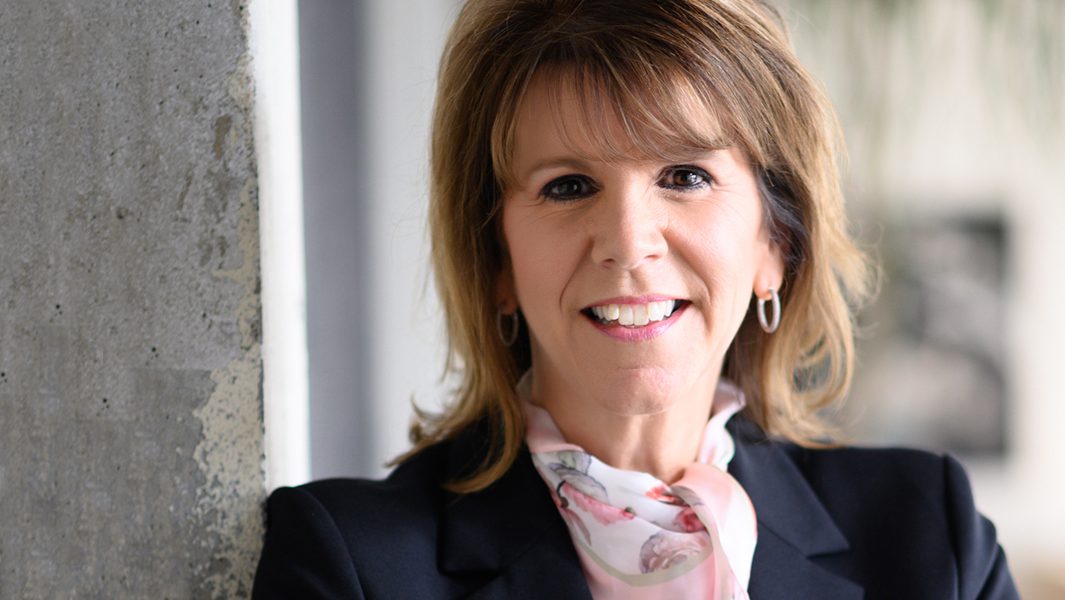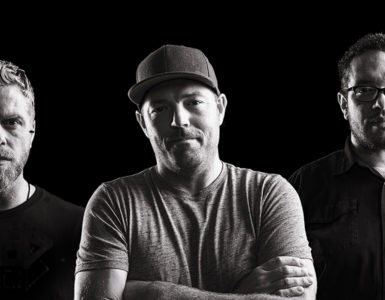Guiding Hospice Towards Next Phase
Story by Michael Seguin
Photography by Mychailo Kovaliv
For Colleen Reaume, the new Executive Director of the Hospice of Windsor and Essex County, it all started with a Mustang.
“I’d just finished St. Clair College,” Colleen recalls. “I’d done a two-year Medical Secretary course in one year. Then two days later I got a call from the cancer program asking me to come in for a job interview.”
Colleen had lost her father to leukemia a couple of years prior, so working for Windsor Regional Hospital’s Cancer Program was a terrifying prospect for her. Especially considering how she hadn’t even applied for the job.
“I called her back and said, ‘How the heck did you get my name?’ And she told me that my teacher had told her to call me,” Colleen reports. “They had a one year mat leave and my teacher told them I’d be perfect for it. So, I went in to meet her. But, I was doing the great debate. Do I really want to stop going to school? I’m not even really sure where I’m going in life. But I decided that it was a great chance to get experience—and, to be quite truthful, I wanted to buy a Mustang.”
Colleen got her Mustang. Since then, she has been deeply embroiled in Windsor’s healthcare community.
The last 30 years have been busy ones. Colleen has served as both a senior member of Windsor Regional Hospital’s Cancer Program and as the Director of the Regional Cancer Program, Erie St. Clair. She also obtained her Masters of Healthcare Leadership from Royal Roads University in British Columbia during her early forties, while working full-time.
During this time, Colleen considered her future plans.
“When I was writing the application for the Master’s program we had to do a five-year visionary exercise,” Colleen states. “This was over 10 years ago. So, I wrote that I wanted to be the Executive Director of the Hospice Windsor and Essex County. My husband and I were making dinner and having a glass of wine. It was kind of a joke.”
During her career, Colleen was no stranger to the Hospice of Windsor and Essex County. While working at Windsor Regional Hospital’s Cancer Program, Colleen became acquainted with Carol Derbyshire, the previous Executive Director.
“My job in the cancer program, no matter what title I had, was patient navigation and advocacy for patients,” Colleen explains. “Carol and I first established a relationship because she called me one day asking for help navigating somebody through the system. It’s very anxiety-provoking when you’re waiting for a call from the cancer program. So, Carol would call me up and say, you know, ‘Ms. Smith is a client of ours at Hospice and they’re really feeling tense. Can you tell me where they are in the system?’”
From there, Colleen and Carol quickly became each other’s lifelines.

“We very quickly found ourselves on each other’s speed-dial,” Colleen laughs. “We called each other a number of times advocating for patients on both ends. The healthcare system is very complicated and it’s very difficult. And sometimes it can help patients if they can just find out where they are in the system. We did a lot for each other. At some point, I joined the committee here at Hospice. We sat on a board together.”
Naturally, when Carol retired, she asked Colleen if she was going to apply for the open position.
“And I said heck no!” Colleen laughs. “I’d been working full-time. I never stopped going to school. I was travelling to Sarnia and Chatham for work. I was living a pretty hectic lifestyle. And I thought, ‘Do I really want to start something new?’ I remembered what I had written in my five-year vision, but I wasn’t sure that was what I wanted to do. So, I walked away. I must have had the application open for a couple of months.”
Despite a valiant effort, Colleen could not ignore her calling.
“Finally, about a week before it closed, I thought to myself, ‘This is what I wanted to do. Why am I not applying? Why am I taking the easy road out?’ So, I decided to throw caution to the wind. I applied.”
Colleen Reaume has been serving as the Hospice of Windsor and Essex County for almost a year now. So far, she remains optimistic about the next phase of Hospice’s legacy.
“The stars are aligning for us,” Colleen states. “I think that a couple of the big things that we have to work on is IT, information sharing. Your electronic medical record, your EMR. Patients today don’t come with one issue. We’re living longer and as we get serious illnesses we have multiple issues. Multiple issues, multiple complications, which means multiple providers. You might have lots of different specialists that all need access to different information. So one of the things I want to work on is gaining some stability and information sharing within our partnerships. I’m very excited about the work we can do together. We have a great road ahead of us in terms of palliative care.”
And according to Colleen, this cooperative approach may represent a growing trend in the healthcare community.
“No one can really close their eyes and see what [the future] looks like,” Colleen explains. “But I think that has given us permission to behave differently. I find that people are showing up at the table wanting a much more holistic approach. I see Windsor-Essex as taking down the walls of organizations and having a lot more collaboration in terms of community partnerships.”
And for Colleen, this cooperation is emblematic of Hospice’s approach to palliative care.
“In other healthcare domains, the team is often looking at disease-specific treatment,” Colleen explains. “In the cancer world, we look at the patient in a holistic way, but not at the depth that the palliative team does. So here at Hospice, the palliative care team comes in with a multidisciplinary approach. We actually meet once a week and have a conversation about the patients cases. So, if somebody has a particular illness they might have anxiety, so we have social workers here. They might be questioning the meaning of life, so we have spiritual care coordinators. We have different specialists that can work with the patient very differently than other organizations. And we’re very fortunate because some of that isn’t government-funded and we have such a strong, strong donor base.”
But for Colleen, this generosity is characteristic of Windsor-Essex.
“Windsor-Essex has a lot to brag about and perhaps we don’t brag loudly enough,” Colleen states. “But we have a lot to contribute to the province and healthcare is no different than that. People are afraid to come down the 401, but there are some top-notch, world-class programs that exist in Windsor-Essex. And palliative care is absolutely booming.”







Add comment